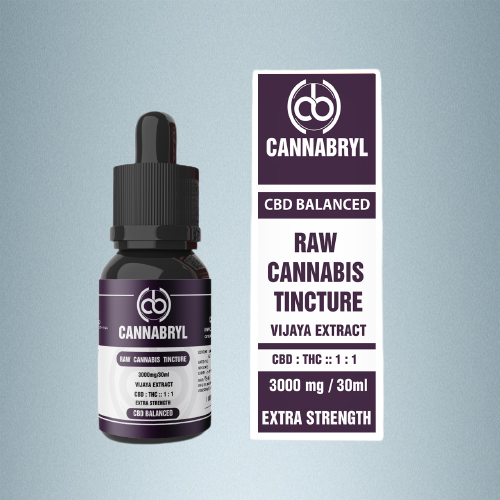SUGGESTED PRODUCTS
Access safe and secure dashboard to track orders and monitor your health.
VIJAYA TRIGUNA
Extract strength : 10000 mg Cannabinoid Strength : 4000 mg
VIJAYA TRIDOSHA 30ml
10,000 mg of Dewaxed Cannabis Extract & 4000mg Cannabinoids
Dewaxed Vijaya Tincture 4:1 3000mg
Dewaxed Cannabis Tincture is a formulation based on Dewaxed Cannabis Extract, wherein cannabis plant’s waxes, Lipids and chlorophyll are removed to a great extent to improve the taste and texture of the Tincture. Apart from waxes, lipids and chlorophyll all active naturally occurring cannabinoids, terpenes and flavonoids are present in dewaxed tincture. The dewaxed products offered under Cannabryl Brand tastes just like any other medicinal taste but a strong flavor of Cannabis. But it is not oily, greasy. The Tincture just mixes with Saliva and is gulped down the throat easily. Bitterness associated with RAW products is also removed to a large extent.
Dewaxed Vijaya Tincture 4:1 1500mg
Dewaxed Cannabis Tincture is a formulation based on Dewaxed Cannabis Extract, wherein cannabis plant’s waxes, Lipids and chlorophyll are removed to a great extent to improve the taste and texture of the Tincture. Apart from waxes, lipids and chlorophyll all active naturally occurring cannabinoids, terpenes and flavonoids are present in dewaxed tincture. The dewaxed products offered under Cannabryl Brand tastes just like any other medicinal taste but a strong flavor of Cannabis. But it is not oily, greasy. The Tincture just mixes with Saliva and is gulped down the throat easily. Bitterness associated with RAW products is also removed to a large extent. Tinctures are a great way to modulate formulations according to the desired strength. They are less concentrated than extracts and are more dilute, which can be easily be dispensed through a glass dropper. There is no major therapeutic difference between the extract and Tinctures, it’s more of a personal preference of dispensing and severity of the condition. For Example, if you have an acute disease or chronic pain, Doctor may prescribe a more potent extract than a tincture however if the condition is mild like sleep disorder, you will most probably be prescribed only the mild potency of Tincture.





DISCUSSION FORUM INFLAMMATION